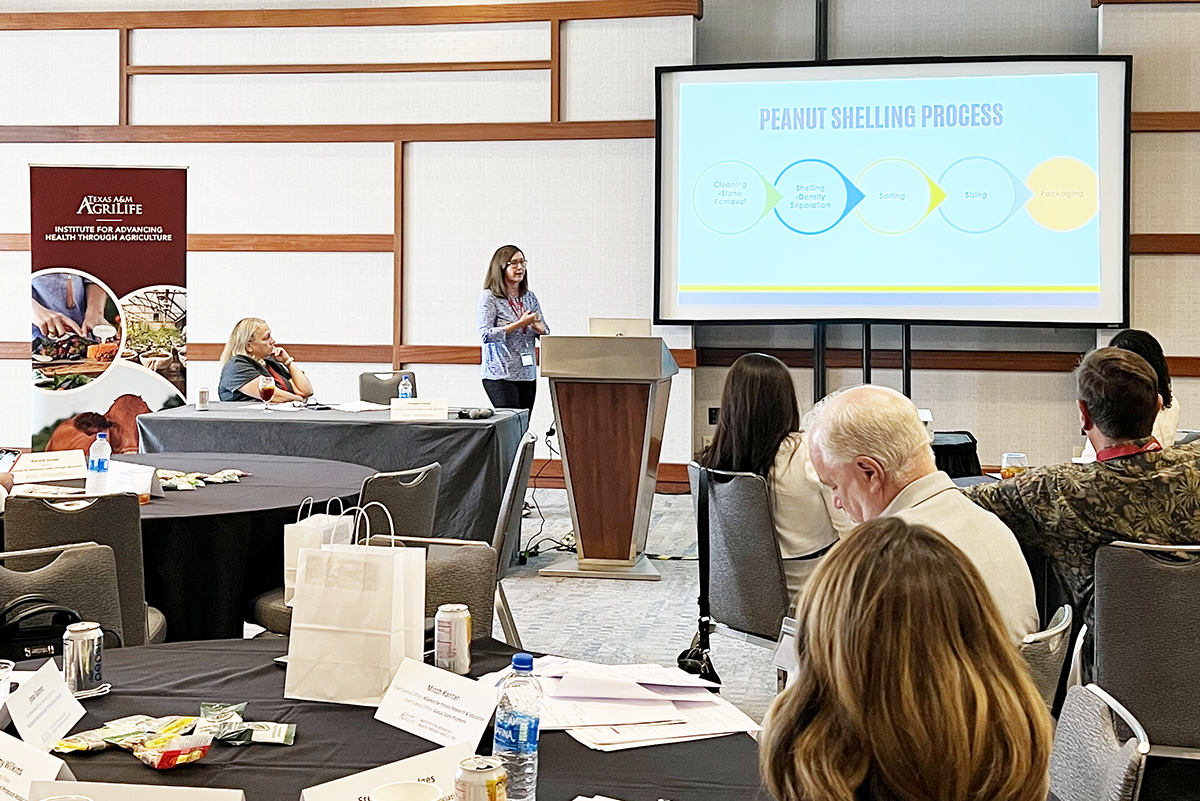Institute for Advancing Health Through Agriculture hosts first research workshop
Stakeholders discussed human nutrition programs, needs and priorities
On Aug. 1-2, the Texas A&M AgriLife Institute for Advancing Health Through Agriculture, IHA, held its first workshop to engage stakeholders from the food-agriculture value chain. The workshop enabled production agriculture groups to further understand priorities, gaps and opportunities in precision nutrition, responsive agriculture, and social and behavioral research.

Bringing together more than 50 people from over 30 different organizations representing commodities nationally and in Texas, the two-day event gave production agriculture groups an unprecedented opportunity to share and discuss their human nutrition research programs and priorities. The workshop was spearheaded by Elizabeth Parker, DVM, IHA interim associate director for responsive agriculture.
Patrick Stover, Ph.D., director of the IHA, kicked off the event with an overview of the challenges facing the food system and the IHA’s role in developing technologies and research to help address these challenges.
“With a focus on providing people with sufficient calories and preventing hunger as the endpoint, the food systems of today have been incredibly successful,” said Stover. “The imperatives of our food system have changed and continue to shift. Now, the food system needs to do even more. It needs to support people’s health, sustain or improve the environment, and provide economic benefits for the very small number of people who produce food for the world.”
Stover explained that The Texas A&M University System has been highly supportive of the idea that agriculture is the solution to addressing these new imperatives of the food system. The IHA is the world’s first research institute to bring together precision nutrition, responsive agriculture, and social and behavioral research to reduce diet-related chronic disease in a way that considers environmental and economic effects.
“The bold vision of the institute is literally a game-changer, with the ultimate beneficiary being the health of all of us who consume food,” said Mike Adams, chair of the American Pecan Council and owner of Royalty Pecan Farms and workshop attendee.
Wide array of groups and topics
At the workshop, groups representing row food crops, nuts, tree nuts, fruits and vegetables, livestock and dairy highlighted several key priority areas, many of which surrounded cardiometabolic health, gut health, antioxidants, anti-inflammatory substances and other key health attributes of foods.
Among the attendees was Stephanie Hodges, a registered dietitian nutritionist and consultant for the International Fresh Produce Association, IFPA.
“IFPA appreciated the opportunity to present at the workshop and learn from others on how we can further collaborate through research and advocacy opportunities to improve the health and nutrition of individuals,” Hodges said. “We are grateful for IHA’s leadership to bring together various stakeholders, including those in nutrition, agriculture and research to work towards a healthier future.”
Workshop discussions provided feedback and insight to the IHA leadership team on potential areas of focus and opportunity as the IHA builds out long-term research plans.
“Looking to the future, it’s important for all commodities to ensure they are grown sustainably and offer full nutritional benefits – while being economically viable for our agricultural producers,” said David Gibson, Texas Corn Producers executive director. “This is particularly important for commodities such as corn that are a food product themselves or an ingredient in thousands of food items in the grocery store.”
Enabling close partnerships and collaborations
The IHA is partnering with the U.S. Department of Agriculture Agricultural Research Service, ARS, Responsive Agricultural Food Systems Research Unit. Co-located within the IHA, the ARS unit will work collaboratively with other ARS members and land-grant universities to bring big data, state-of-the-art sensors and computational systems approaches to responsive agriculture and precision nutrition. Representatives from ARS joined the meeting to hear and engage with commodity groups to inform the research unit’s work.
“Our collaboration with IHA focuses on delivering precision nutrition while building a more sustainable food supply that will positively impact the health of people around the world,” said Pamela Starke-Reed, ARS deputy administrator for nutrition, food safety and product quality/new uses. “By looking at the nutritional needs and intake through the eyes of precision nutrition we will be able to identify the role it plays in health promotion and chronic disease prevention, while bridging the gap in health disparities and strengthening our food supply.”
This workshop marks the first in a series of stakeholder workshops that seek to generate awareness, gather input and ultimately inform research and innovation throughout the food-agriculture value chain as the IHA further develops and implements its research programs.
“One of the most important societal challenges facing us today is ensuring our food system can adequately nourish and sustain people,” said Shalene McNeill, Ph.D., a registered dietician and executive director of nutrition research for the National Cattleman’s Beef Association. “As a producer-supported program, the Beef Checkoff appreciates opportunities to work with other agricultural commodities and across all sectors, from farm to table, to collaborate on science-based initiatives that can help advance a healthy, sustainable food system. We all must work together to find efficiencies that can effectively advance health through agriculture and science.”


